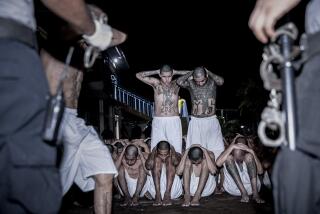S. Africa Catholic Bishops Condemn Detention of Blacks
JOHANNESBURG, South Africa — Roman Catholic bishops Friday condemned the white government’s practice of detaining thousands of blacks--many of them children--without trial during an unprecedented campaign of repression.
“We condemn this in the strongest possible terms and accuse the present South African government of a serious abuse of power,” the bishops said in a statement.
“We can find no justification for this continuing inhuman oppression, and we warn that it is a measure that does great damage for the present and the future.”
The statement was contained in an open letter to detainees signed by 13 bishops and seven other officials of the Catholic church in South Africa. It was published as an advertisement in several newspapers.
It came one day after government opponents observed a “National Detainees Day” to focus attention on the estimated 25,000 people--10,000 of them children as young as 9 and almost all of them black--who have been jailed without charge under sweeping police powers authorized during a nine-month-old crackdown on racial unrest.
Death Toll Now 2,300
More than 2,300 people, the overwhelming majority of them black, have been killed since a wave of violence against the white-led minority government and its policies of racial separation, known as apartheid, erupted in September, 1984.
“It is clear to us that our country has seldom witnessed such a wave of repression and such an extensive denial of basic human rights,” the bishops said.
Cardinal Owen McCann, the nation’s senior Catholic prelate, and Bishop Wilfred Napier, president of the Southern African Catholic Bishops Conference, were among the officials who signed the letter published by Johannesburg’s liberal Weekly Mail, the Catholic weekly New Nation and other publications.
“To all of you in detention, we send the assurance of our solidarity in your suffering,” the bishops said. “We recognize in your suffering, especially those of you who have been physically assaulted and who suffer solitary confinement, a very important contribution to our struggle for liberation.”
Candlelight Protest
Black activist Winnie Mandela joined a nationwide candlelight protest Thursday night against the detentions, which began after President Pieter W. Botha imposed the state of emergency June 12.
Meanwhile, a human rights group said that abolition of “pass laws” dictating where blacks could live and work has been of no help to most, and many officials behave as if nothing has changed.
A report to the annual conference of Black Sash, a nationwide anti-apartheid group, said blacks still are exploited by employers and harassed by civil servants eight months after the hated laws were taken off the books.
16,181 Inteviews
Black Sash said its findings were based on interviews with 16,181 people at an office it maintains in Johannesburg to advise blacks. It said requests for help increased after the pass laws were scrapped.
“There is an entirely new system of law, but there is no real freedom of movement,” the report said. “There are new names to government offices, but the same officials continue to deal with the public.”
Last year, Botha’s government said abolishing the laws demonstrated its commitment to reform.
The report added:
“Deplorable employment practices continue. For every company which has an organized labor force and positive employment practices, there must be 10 others which exploit their workers and cheat them of their legal rights.”
These were among specific issues mentioned in the report:
--An extreme shortage of urban housing for blacks. Waiting lists for rental housing in some black townships contain thousands of names and date back almost 20 years.
--Difficulties of people from the four nominally independent black homelands in regaining South African citizenship. Many who have worked in South African cities for years, but were not allowed to bring their families along, are classified as homeland residents.
--Unfair dismissals by employers, who often short black workers on pay and do not provide tax and pension documents.
Under the former passbook system, a black without the proper stamp or permit could be evicted from a home, dismissed from a job, jailed or deported to a homeland.
‘One Huge Mess’
New laws that took effect July 1, 1986, require that all South African residents be issued identity cards that do not list the holder’s race. Legal residency is defined by complex legislation, however, and the Black Sash report described the system as “one huge mess.”
Elsewhere, the powerful Zulu leader, Chief Mangosuthu Gatsha Buthelezi, has asked South Africa’s minister of law and order to untie his hands by authorizing him to issue firearm licenses to his followers to help them defend themselves against armed attacks.
More to Read
Sign up for Essential California
The most important California stories and recommendations in your inbox every morning.
You may occasionally receive promotional content from the Los Angeles Times.










